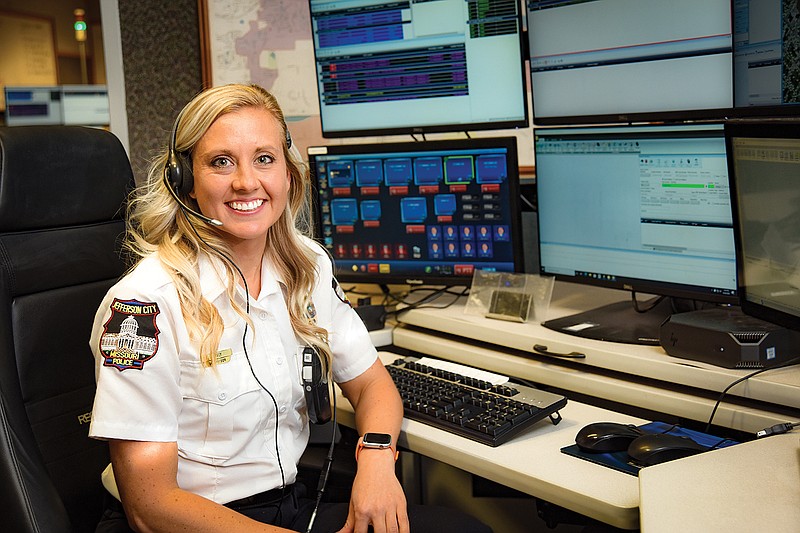When people ask Rachel Irey why she still finds her job as a 911 operator so fulfilling after 15 years, she tells people she was "bit by the bug" a long time ago.
A native of California, Missouri, Irey's first 911 job was with the Moniteau County 911 Center. After two years there, she moved on to the Jefferson City Police Department and has worked in its 911 center ever since. She currently serves as a lead operator.
"I was very unhappy at the job I had and a friend suggested I go for the 911 job in Moniteau County, and I've been at it ever since," Irey said. "Once you get in it, you rarely get out to do normal work again."
Working in a 911 call center is considered a stressful job, but Irey said the job can become "kind of addicting."
"I don't foresee I could do a normal 8-to-5 office kind of job," Irey said. "Those of us who work in these types of jobs are adrenaline junkies. We like to be nosy and know what's going on."
It's difficult for Irey to describe a "normal" day for a 911 operator, which is part of what she loves about the job.
"It's not the same day to day," Irey said. "You don't know what's on the other end of the phone, so you have to be prepared for everything."
The JCPD 911 Center has three operator positions, along with the lead operator. One operator is dedicated to dispatching JCPD officers, another is dedicated to the Cole County Sheriff's Department, and the other is called the "phones and fire" operator, who answers 911 calls and dispatches calls for the Jefferson City Fire Department and fire protection districts that serve Cole County.
"Training for this job is very hard because you cannot possibly train for every single scenario," Irey said. "We give you a tool box of skills and resources, and then you have to use your problem-solving skills to figure things out."
Irey said they have a 22-week training program, with 20 of those weeks actually in the communications center on the consoles.
"It's a high-paced environment, and you feel like you're making a difference, and that's rewarding," Irey said.
Currently law enforcement agencies are having a hard time finding people to fill positions, particularly support staff positions such as 911 operators. The JCPD 911 Center just hired a new operator and is still looking to fill one or two positions, Irey said. There are 20 full-time operators at JCPD, with a handful of part-time operators who help out.
"It isn't for everybody, mainly because of the high-stress environment the job can bring," Irey said. "We are being introduced to more and more improved technology, so you have to be able to learn quickly. A 911 operator needs to be able to think through a situation and make decisions on their own because there's not a black-and-white answer to everything."
In an effort to protect responders during the COVID-19 pandemic, Irey said, 911 operators ask callers a series of questions in COVID-19-related situations to determine whether in-person contact is necessary.
"For non-life-threatening issues, if at all possible, we have been trying to take care of those through phone contact, which is out of the norm from what we've done in the past," Irey said.
Irey encouraged anyone thinking about a new career who is not afraid of challenges to consider law enforcement.
"If somebody wants something that's interesting and not the same day in and day out, this is for them," Irey said. "Working here, you develop into a family. You spend your nights, weekends and holidays with these people, and you see them more than your family, so you develop close bonds.
"Our No. 1 goal is public safety and our responders' safety," she said. "Everyone goes home safe."

